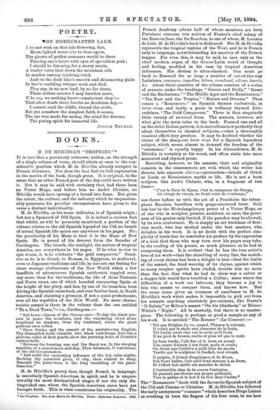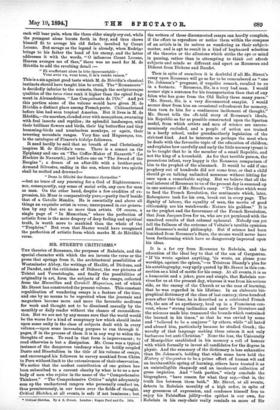BOOKS.
M. DE HEREDIA.'S " TROPHIES."* IT is rare that a previously unknown author, on the strength of a single volume of verse, should attain at once to the con- siderable position which M. de Heredia already occupies in French literature. Nor does the fact find its full explanation in the merits of the book, though great. It is original, in the sense that no other French poet of the day could have written it. But it may be said with certainty that, had there been no Victor Hugo, and before him no Andre Chenier, no Heredia would have sprung at a bound into fame. But given the talent, the culture, and the industry which he unquestion- ably possesses, his peculiar circumstances have given to his verse a distinct individuality.
M. de Heredia, as his name indicates, is of Spanish origin ; but not a Spaniard of Old Spain. It is indeed a curious fact that whilst, as will be presently mentioned, a portion of the volume relates to the old Spanish legend of the Cid, no breath of actual Spanish life meets one anywhere in his pages. No; the peculiarity of his Muse is that it is the Muse of New Spain. He is proud of his descent from the founder of Carthagena. The breath, the sunlight, the nature of tropical America, are everywhere in his pages. If he tries to rise to epic strain, it is to celebrate "the gold conquerors." Sensi- tive as he is to Greek, to Roman, to Egyptian, to medimval, even to Japanese traditions and life, he has not one feeling for those strange civilisations of the New World which a few handfuls of adventurous Spanish cutthroats toppled over, any more than for the traditions, the life of those Teutonic and Norse races, one of which bearded conquering Spain at the height of her glory, and has, by one of its branches, been driving the Spanish races back, and ever farther back, in North America, and claiming a primacy, if not a quasi-protectorate, over all the republics of the New World. No more charac- teristic sonnet is there in the volume than the one entitled "To a Dead Town,"—i.e., Carthagena :— " Sad town—Queen of the Oceans once—To-day the shark pur- sues in peace the scombers, And the wandering cloud alone lengthens its shadows, Over thy roadstead, where the giant galleons once rolled. Since Drake, and the assault of the misbelieving English, Thy dismantled walls crumble into black ruin-heaps, And like a glorious collar of dark pearls, show the yawning holes of Pointis's cannon-balls.
"Between the burning sun and the fleecy sea, In the sleeping sunshine of a monotonous mid-day, Thou &earnest, 0 warrioress, of the old Conquistadors.
"And midst the enervating influence of the hot, calm nights, Rocking thy quenched glory, 0 city, thou sinkest to sleep, Beneath the palm-trees, to the long trembling of the palm- branches."
M. de Heredia's poetry thus, though French in language, is essentially Spanish-American in spirit, and he is unques- tior ably the most distinguished singer, if not the only dis- tinguished one, whom the Spanish-American races have yet brought forth. . This is what constitutes his originality. The • Les Trophies. Par Jose Marla de Heridia. Paris: Alphonse Demerre. 1893. French Academy (about half of whose members are born Parisians) contains two natives of France's chief colony of the Eastern Seas, the Ile Bourbon, to one of whom, M. Leconte de Lisle, M. de Heredia's book is dedicated. But M. de Heredia, represents the tropical regions of the West, and he is French only in language, notwithstanding his mastery of the French tongue. For even this, it may be said, he uses only as the chief modern organ of the Grreco-Latin world of thought and feeling, modified in his case by tropical American influences. His diction is ultra-classical. One must go. back to Ronsard for so large a number of out-of-the-way Latinisms, exsangue, impollue, hilare, irradiant, ultime, barrir, &c. About three-quarters of the volume consists of a series of sonnets, under the headings, "Greece and Sicily," "Rome and the Barbarians," " The Middle Ages and the Renaissance," "The East and the Tropics," "Nature and Dreams." Then comes a "Romancer° " on Spanish themes exclusively, in terza lima, and lastly, a poem in ordinary rhymed Alex- andrines, "The Gold Conquerors." There is thus singularly little variety of metrical form. The sonnets, however, are- what give the main value to the book. Framed one and all on the strict Italian pattern, it is marvellous how perfectly they adapt themselves to classical subjects,—what a thoroughly classical effect they produce. It may be doubted whether the choice of the sharp-cut terza rima for a Spanish legendary subject, which seems almost to demand the freedom of the "assonance," is equally happy In his Alexandrines, M. de Heredia is certainly at his worst, and often sinks into mere measured and rhymed prose.
Reverting, however, to the sonnets, their real originality consists in the consummate art with which the writer has thrown into separate iiiii;Ax‘s—picturelets—details of Greek or Latin or Renaissance myths or life. He is not a born sculptor, like Andre °haler, who, in a fragment of two-
lines—
" C'est le Dieu de Nyssa, c'est le vainqueur du Gauge, Au visage de vierge, au front ceint de vendange," can throw before us with the art of a Praxiteles the trium- phant Bacchus. beardless with grape-cinctured brow. Still less has he the Michelangelesque power of a Victor Hugo, as. of one who is sculptor, painter, architect, at once, the great- ness of his genius only limited, if the paradox may be allowed, by its own exuberance. He is simply an art workman of first- rate merit, who has studied under the best masters, who' delights in his work. It is no doubt with the perfect sim- plicity of truth that he concludes his preface by the expression of a wish that those who may turn over his pages may take, in the reading of his poems, as much pleasure as he had iii composing them. It is evident that he has the true artist's. love of his work—that the chiselling of every line, the match- ing of every rhyme has been a delight to him—that the limits of the sonnet, the fixed weaving of its rhyme, against which so many rougher spirits have chafed, trouble him no more than the fact that what he had to chase was a salver or a dagger-hilt would have troubled a Cellini; since where the difficulties of a work are inherent, they become a joy to- him who means to conquer them, and knows how. But the same cause gives an evenness of excellence to M. de Heredia's work which makes it impossible to pick out from his sonnets anything absolutely pre-eminent, like Dante's
"II Salute," or Milton's sonnet "On his blindness," or Blanco White's "Night." All is masterly, but there is no master- piece. The following is perhaps as good a sample as any of his work. It is entitled "The Runner" (Le Coureur):— 'Tel que Delphes ra vu, quand, Thymos Is &Avant, Ii vol ait par le stade aux clamours de la foule, Tel Lades court emu sur le sock qu'il foule D'un pied de bronze, svelte et plus vif que le vent.
Le bras tendu, rceil fire et le terse en avant, tine sueur d'airain d son front perle et coule; On dirait que rathlete a jailli hors du moule, Tandis que le sculpteur le fondait, tout vivant.
Ii palpite, il fremit d'esperance et de flevre, Son front halete, l'air qu'il fend manque ea Byre, Et reffort fait saillir see muscles de metal.
L'irresistible elan de la course rentraine, Et passant par-dessus son propre piedestal. Vera in palms et le but il va fuir dans rarbne."
The" Romancer° " deals with the favourite Spanish subject of the Cid and Jimena or Chimene. M. de Her4dia, has followed the early anonymous" romance" which describes Diego Lainez as crushing in turn the fingers of his four sons, to see how each will bear pain, when the three elder simply cry out, while the youngest alone bursts forth in fury, and thus shows himself fit to avenge his old father, insulted by Count Lozano. But savage as the legend is already, when Rodrigo brings to his father the head of his enemy, and the latter addresses it with the words, "0 infamous Count Lozano, Heaven avenges me of thee," there was no need for M. de Heredia to add the revolting detail :—
" Et souffietant alors la tete epouvantable :
Vous avez vu, vous tons, il m'a rendu raison."
This is a sin against good taste which M. de Heredia's classical instincts should have taught him to avoid. The " Romancer° " is decidedly inferior to the sonnets, though the sculpturesque qualities of the terza rim,a rank it higher than the epical frag- ment in Alexandrines, "Les Conquerants de l'Or." And yet this portion alone of the volume would have given M. de Heredia a distinct place among French poets. Chateaubriand before him had seen tropical America. But it lives in M. de Heredia,—its marshes, clouded over with mosquitoes, swarming with foul insects and reptiles ; its splendid landscapes, with their brilliant flowers and birds, their big butterflies and tiny humming-birds and numberless monkeys, or again, their towering mountain ranges. Very fine and Hugoesque, too, is the catalogue of Pizarro's hidalgo followers.
It need hardly be said that no breath of real Christianity inspires M. de Heredia's verse. There is a sonnet on the Epiphany and one on "The Coffer-Maker of Nazareth" (Le Huchier de Nazareth), just before one on "The Sword of the Borgias "; a dream of an after-life with a brother-poet, Armand Silvestre, ending in the sun, where their two spirits shall be melted and drowned— "Dana la felicite des flammes eternelles "
—but no trace of any yearning for a God of Righteousness ; nor, consequently, any sense of social evils, any care for man as man. On the other hand, despite a few crudities of ex- pression, his Muse is comparatively pure,—purity itself beside that of a Catulle Mendes. He is essentially and above all things an exquisite artist in verse, unsurpassed in our genera- tion by any that are no more than artists. Of course, a single page of "In Memoriam," where the perfection of artistic form is the mere drapery of deep feeling and spiritual truth, is worth more to mankind than the whole of the " Trophees." But even that Master would have recognised the perfection of artistic form which marks M. de Heredia's verse.







































 Previous page
Previous page